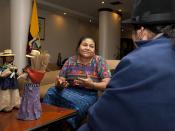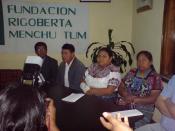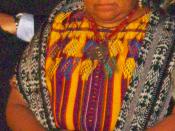When we read a non-fiction book, it is easier to believe that what we're reading is the truth. First of all, not many readers are that concerned about if what they're reading is made up or not to think about it and second of all, it is simply easier to believe that what the writer is telling us is the truth. In most cases the reader simply believes the writer. In many cases it is also too complicated to research the information we are told in the book. But we are able to tell when something is suspicious. We have to, for example, include factors such as if the book had been translated. In the case of I, Rigoberta Menchu, the narrator, Menchu, told her story to Burgos-Debray, who recorded the conversation and later edited it. In the introduction, we are also told that Rigoberta Menchu's narration (and she mentions it in the actual book herself) is "a mixture of Spanish learned in the political struggle replete with revolutionary terms; and, most of all, Spanish which is heavily coloured by the linguistic constructions of her native Quiche and full of the imagery of nature and community traditions."
Menchu herself says a few times that she finds speaking Spanish difficult. This also has to be taken into account. It was hard for Menchu to express her story in a foreign language. After this the story was edited (we do not know what was left out, what addedâ¦) and after this translated. There is also the factor of how much we trust what Menchu tells us; after some deeper research, we might find out, that some actions described in the book never took placeâ¦(it is said several times in the book that it is not a story of Menchu but her...


